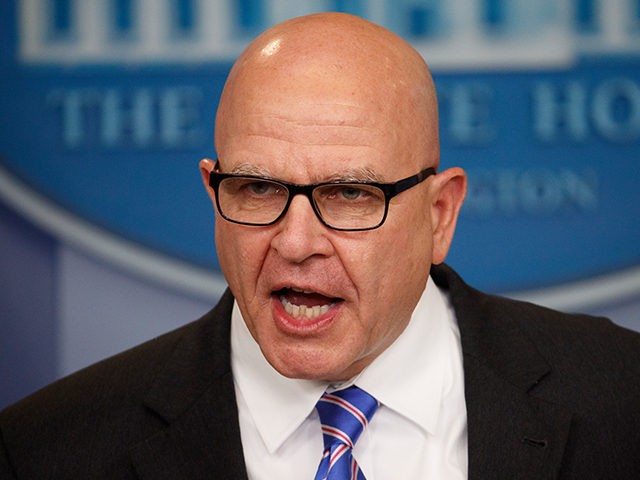H.R. McMaster, in his final remarks as National Security Adviser, blasted Russia for its acts of aggression, warned that President Vladimir Putin believes he is winning a new form of warfare, and said Russia was one of several “revisionist and repressive powers” seeking to undermine America’s “values, institutions, and way of life.”
Speaking at a dinner for the leaders of Estonia, Latvia, and Lithuania hosted by the Atlantic Council in Washington, McMaster denounced Russia for waging “hybrid warfare,” which he described as “a pernicious form of aggression that combines political, economic, informational, and cyber assaults against sovereign nations.”
McMaster’s analysis of the Kremlin’s battle plan looped in everything from interference in the elections of the United States and other countries and cyber-espionage against NATO to Russia’s unsafe intercepts of American aircraft and the attempted assassination of Sergei Skripal in the United Kingdom. He noted that the Baltic states have all been targeted by Russian hybrid warfare as well.
He put Russia’s actions in the context of other bad actors assaulting Western nations with tactics designed to “achieve objectives while falling below the threshold for military response.”
“Revisionist and repressive powers are attempting to undermine our values, our institutions, and our way of life,” he said, describing the conflict as a “fundamental contest between our free and open societies and closed and repressive systems.”
McMaster said:
Some nations have looked the other way in the face of these threats. Russia brazenly, and implausibly denies its actions, and we have failed to impose sufficient costs. The Kremlin’s confidence is growing as its agents conduct their sustained campaigns to undermine our confidence in ourselves and in one another.
The Atlantic Council’s account of the event took this as the outgoing NSA nearly “upstaging” his boss, as President Trump had met with the Baltic presidents earlier in the day and told them, “Probably nobody has been tougher to Russia than Donald Trump.”
The Atlantic Council’s Ashish Kumar Sen compared Trump’s remarks unfavorably to the “blistering rebuke of Russia” unleashed by McMaster, throwing in some side comments about how Trump’s 2016 presidential campaign is under investigation for “links to Russia” and Trump was “quick to congratulate Putin over a flawed election victory last month and even invited the Russian president to Washington.”
However, McMaster spoke approvingly of the measures the Trump administration has taken against Russia, including the expulsion of 60 Russian diplomats, sanctions against Russian entities for election meddling, increased funding for the European Defense Initiative, and confronting Moscow about its campaign of cyberwarfare.
He added that quite a few of those expelled Russian “diplomats” were better described as intelligence and propaganda officers whose departure will “help protect our democratic institutions and processes.”
McMaster declared:
Mr. Putin may believe that he is winning in this new form of warfare. He may believe that his aggressive actions in the parks of Salisbury, in cyberspace, in the air, and on the high seas can undermine our confidence, our institutions, and our values. Perhaps he believes that our free nations are weak and will not respond to his provocations. He is wrong.
McMaster’s thesis was that the actions taken so far are good, but “we must recognize the need for all of us to do more to deter Russian aggression.” He had four specific suggestions, one of which was NATO countries stepping up to honor their defense commitments, which is one of President Trump’s well-known preoccupations. In fact, Trump raised the issue during his press conference with the Baltic leaders earlier in the day.
“The three presidents just told me that NATO is taking in a tremendous amount of money because of Donald Trump. That would have never happened. So NATO is much stronger. You may want to say that,” the president proposed. He then invited President Dalia Grybauskaite of Lithuania to say it, and she did, with a little humorous prodding from her host.
McMaster’s other proposals for urgent action included tightening integration of military, political, economic, and law enforcement systems to shield against Russian hybrid warfare, beefing up defenses against cyberwarfare and maintaining “strategic confidence” both in a military sense along troubled borders and by making it clear our values of freedom and the rule of law will not be shaken by hybrid warfare sabotage.
Trump stressed an additional factor several times during his remarks: the fact that increased American oil and gas production has weakened the Russian economy while boosting American energy independence. He is surely correct that teeth have been ground in the Kremlin over that shift in the energy landscape. What gets Trump labeled soft on Russia, besides the media’s enduring investment in their “Trump and Putin stole the White House from Hillary Clinton” narrative, is that Trump constantly states that he desires better relations with Russia.
“Getting along with Russia would be a good thing, not a bad thing. And just about everybody agrees to that, except very stupid people,” as Trump put it on Tuesday. He expressed similar hopes for improved relations with China, even as the headlines were dominated by the stock market’s plunge amid fears he has launched a trade war against the Chinese. In Trump’s version of carrot-and-stick diplomacy, the carrot is tied to the stick with a very short string.

COMMENTS
Please let us know if you're having issues with commenting.